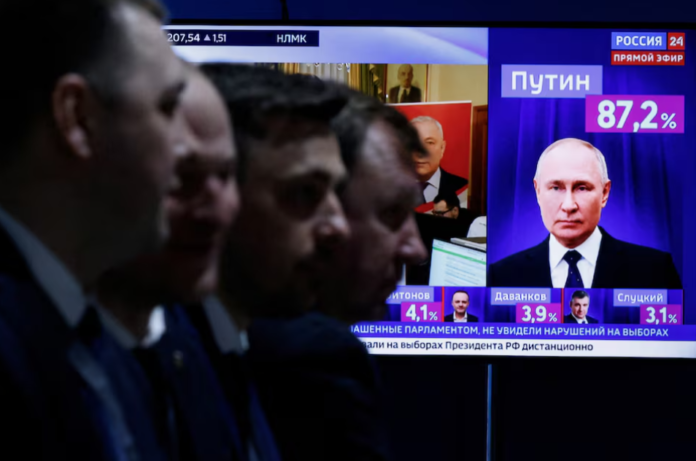Russian President Vladimir Putin basked in a victory early Monday that was never in doubt, as partial election results showed him easily securing a fifth term after facing only token challengers and harshly suppressing opposition voices, according to France24.
With little margin for protest, Russians crowded outside polling stations at noon Sunday, on the last day of the election, apparently heeding an opposition call to express their displeasure with Putin. Still, the impending landslide underlined that Russian leader would accept nothing less than full control of the country’s political system as he extends his nearly quarter-century rule for six more years.
Putin hailed the early results as an indication of “trust” and “hope” in him — while critics saw them as another reflection of the preordained nature of the election.
“Of course, we have lots of tasks ahead. But I want to make it clear for everyone: When we were consolidated, no one has ever managed to frighten us, to suppress our will and our self-conscience. They failed in the past and they will fail in the future,” Putin said at a meeting with volunteers after polls closed.
British Foreign Secretary David Cameron wrote on X, formerly known as Twitter: “The polls have closed in Russia, following the illegal holding of elections on Ukrainian territory, a lack of choice for voters and no independent OSCE monitoring. This is not what free and fair elections look like.”
Any public criticism or his war in Ukraine has been stifled. Independent media have been crippled. His fiercest political foe, Alexei Navalny, died in an Arctic prison last month, and other critics are either in jail or in exile, France24 reports.
Beyond the fact that voters had virtually no choice, independent monitoring of the election was extremely limited. According to Russia’s Central Election Commission, Putin had some 87% of the vote with about 90% of precincts counted.
In that tightly controlled environment, Navalny’s associates urged those unhappy with Putin or the war in Ukraine to go to the polls at noon on Sunday — and lines outside a number of polling stations both inside Russia and at its embassies around the world appeared to swell at that time.
Among those heeding call was Yulia Navalnaya, Navalny’s widow, who joined a long line in Berlin as some in the crowd applauded and chanted her name.
Asked whether she had a message for Putin, Navalnaya replied: “Please stop asking for messages from me or from somebody for Mr. Putin. There could be no negotiations and nothing with Mr. Putin, because he’s a killer, he’s a gangster.”
But Putin brushed off the effectiveness of the apparent protest.
Unusually, Putin referenced Navalny by name for the first time in years at the news conference. And he said he was informed of an idea to release the opposition leader from prison, days before his death. Putin said that he agreed to the idea, on condition that Navalny didn’t return to Russia.
Some Russians waiting to vote in Moscow and St. Petersburg told The Associated Press that they were taking part in the protest, but it wasn’t possible to confirm whether all of those in line were doing so.
Meanwhile, supporters of Navalny streamed to his grave in Moscow, some bringing ballots with his name written on them.
Putin on Monday said law enforcement would take action against people who spoiled their ballots.
“People who spoiled their ballot papers… These kinds of people have to be dealt with,” Putin said in a late night address after claiming victory in the elections.
Voting took place over three days at polling stations across the vast country, in illegally annexed regions of Ukraine and online. As people voted Sunday, Russian authorities said Ukraine launched a massive new wave of attacks on Russia, killing two people — underscoring the challenges facing the Kremlin.
Despite tight controls, several dozen cases of vandalism at polling stations were reported across the voting period.
Several people were arrested, including in Moscow and St. Petersburg, after they tried to start fires or set off explosives at polling stations while others were detained for throwing green antiseptic or ink into ballot boxes.
The OVD-Info group that monitors political arrests said that 80 people were arrested in 20 cities across Russia on Sunday.
Beyond Russia, huge lines also formed around noon outside diplomatic missions in London, Berlin, Paris, Milan, Belgrade and other cities with large Russian communities, many of whom left home after Putin’s invasion of Ukraine.
Boris Nadezhdin, a liberal politician who tried to join the race on an anti-war platform but was barred from running by election officials, voiced hope that many Russians cast their ballots against Putin.


